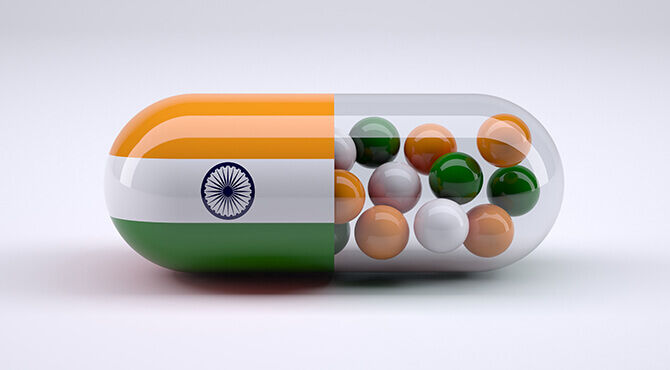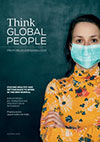Covid-19 Exposes Indian Pharma's Overdependence On China
The pandemic is laying bare global reliance on China for drugs. As Canada abandons clinical trials of a Covid-19 vaccine, China is blocking shipment of some of its key active pharmaceutical ingredients (APIs).

Click on the cover to access the digital edition or read all of the articles on our website.
India’s pharma supply chain
India's reliance on pharma ingredient imports has risen over the past few decades due to the higher cost of domestic production. The price gap with China has reached as much as 20-30%, particularly for energy-intensive fermentation-based ingredients used in anti-infectives. For some life-saving drugs, including penicillin and ciprofloxacin, import dependence is more than 90%.The Indian pharmaceutical industry is the third largest in the world in terms of volume and fourteenth largest in terms of value. Official data shows India’s pharmaceutical imports in 2018-19 was USD $10.43 billion (INR 76,303.53 crore) with exports of USD $19.27 billion (INR 1,40,961.31 crore). India continues to be one of the leading exporters of formulations or generic medicines to the global market, but in the case of raw materials – intermediaries and APIs – China enjoys the number one position on the global stage.
India continues to be one of the leading exporters of formulations or generic medicines to the global market, but in the case of raw materials – intermediaries and APIs – China enjoys the number one position on the global stage.Canada conundrum
Given the global pharma industry’s dependence on China for the raw materials and APIs needed to make medicines, many economies have faced severe issues in securing ingredients during the current crisis.The pandemic’s spread from one province in China globally disrupted production across the world, highlighting how manufacturing in developed countries is reliant on international trade and supply chains – particularly since countries banned the export of key medicines and equipment.This May, the Canadian government announced a partnership between the National Research Council of Canada (NRC) and CanSino Biologics, headquartered in Tianjin, China. The trials were to be held at the Canadian Centre for Vaccinology at Dalhousie University in Halifax, Nova Scotia, which also shared its research expertise with the Chinese firm.Yet in late July, the Canadian press reported that China had held up shipments to the Halifax researchers. According to the NRC, the vaccine candidate was not approved by Chinese customs to export to Canada: "Subsequent to signing, the Government of China introduced process changes regarding shipping vaccines to other countries," the NRC said in a statement. Amid rising tensions between the two countries, Canada has been forced to abandon the first proposed clinical trials for a Covid-19 vaccine in the country. Instead, the Canadian government turned to American drug companies, signing agreements for 114 million doses of potential vaccine candidates to combat the coronavirus pandemic. Canadian Prime Minister Justin Trudeau announced that the country had inked deals with two American companies, Novavax and Johnson & Johnson, and had also signed similar agreements with two other companies, Pfizer and Moderna."With these additional agreements in place, Canada has now secured access to four of the leading vaccine candidates," the Prime Minister’s Office (PMO) said in a statement.
Instead, the Canadian government turned to American drug companies, signing agreements for 114 million doses of potential vaccine candidates to combat the coronavirus pandemic. Canadian Prime Minister Justin Trudeau announced that the country had inked deals with two American companies, Novavax and Johnson & Johnson, and had also signed similar agreements with two other companies, Pfizer and Moderna."With these additional agreements in place, Canada has now secured access to four of the leading vaccine candidates," the Prime Minister’s Office (PMO) said in a statement.A global response
The CanSino agreement came under criticism when it was announced. It came while two Canadians, including a former diplomat, were being held captive in China, in what Canadian officials described as "hostage diplomacy."Apart from Canada, relations with Beijing have hit a new low in several other countries. The intensifying US-China conflict and worsening diplomatic relations across the region are forcing countries to reconsider whether they can continue doing business in China as before.Last October, Janet Woodcock, of the US Food and Drug Administration’s Center for Drug Evaluation and Research, told a House of Representatives subcommittee on health that the number of facilities in China supplying APIs had more than doubled since 2010 to 13% of all those serving the US market.In December, a delegation of the European Fine Chemicals Group (EFCG), an association representing API manufacturers, informed EC commissioners about measures needed to support the repatriation of pharmaceutical chemical production from China back to Europe.The EFCG estimates that over 80% of chemicals used to make drugs sold in Europe tend to originate from China and India.Amid growing security and transparency concerns, the US and Australia have already entered into an ambitious agreement to create what’s being called a “China-free” supply chain for rare earth materials.Japanese Prime Minister Shinzo Abe, following the Covid-19 outbreak, has already instituted a USD $2 billion fund to help Japanese companies shift back from China.India, Japan and Australia have also started working on a supply chain pact to counter China's dominance. The three nations are to build a “supply chain resilience initiative”. The initiative, first proposed by Japan, is now taking shape, with dates being worked out for sessions with the commerce and trade ministers of the three countries.Japan through its Ministry of Economy, Trade and Industry had approached India, highlighting the urgency to take the supply chain initiative forward. Tokyo is reportedly in favour of launching the initiative this November.India: Make for the world
The proposal has struck a chord with the Indian government, especially in the light of China’s aggressive moves on the Line of Actual Control (LAC) in Ladakh. Sino-Indian tensions shot up in June this year after a violent brawl between Chinese and Indian soldiers along the LAC in the Galwan Valley in eastern Ladakh in which 20 Indian army personnel and an unspecified number of Chinese were killed.With India looking to emerge as an alternative to China, the issue was one of the key themes of Indian Prime Minister Narendra Modi’s Independence Day speech on August 15, where he said that businesses have started viewing India as a possible "hub for supply chains" and that the time is ripe now for India to also "make for the world".As Indian Pharmaceutical Alliance secretary general Sudarshan Jain points out, all countries are trying to diversify from imports of Chinese APIs and intermediaries. "It is not in the national interest to depend on one single source for something as crucial as medicines. India has adopted a right approach – to find alternative sources in the immediate term and to develop domestic capabilities in the medium to long term," he said.Backed by investment
The end of July saw the Indian government's announcement to set up three bulk drug parks for USD $410 million (INR 3,000 crore) and the approval of a USD $949 million (INR 6,940 crore) production-linked incentive package for the promotion of domestic manufacturing of critical intermediates and APIs.Following the announcement, officials of the Federation of Indian Chambers of Commerce and Industry (FICCI), an association of business organisations in India, said the scheme would help promote self-reliance in APIs and key starting materials (KSMs).Dilip Chenoy, secretary general, FICCI said the move was very important, especially from the perspective of “Atmanirbhar Bharat” (self- sufficient India) and the push to “Make in India”, and would strengthen the supply chain to make India the true “Pharmacy of the World”."While it will also result in significant generation of jobs, the government policy will encourage the fermentation-based industry to help build self-reliance as China has gained importance in fermentation-based APIs namely antibiotics and vitamins," said Chenoy.FICCI has termed it a first step towards a sustained effort to help create a thriving API industry in the country as well as help India emerge as a hub for global exports.While the pandemic has accentuated issues like re-shoring and near-shoring key industries and shortening supply chains, it also has provided an open market place for India to dig its heels in and make good on its promise of being the “Pharmacy to the World”.This article is taken from the first issue of Think Global People, the new home of Relocate Magazine.Click on the cover to access the digital edition or read all of the articles on our website.
For more information, visit our India hub.
Subscribe to Relocate Extra, our monthly newsletter, to get all the latest international assignments and global mobility news.Relocate’s new Global Mobility Toolkit provides free information, practical advice and support for HR, global mobility managers and global teams operating overseas.
 Access hundreds of global services and suppliers in our Online Directory
Access hundreds of global services and suppliers in our Online Directory
©2026 Re:locate magazine, published by Profile Locations, Spray Hill, Hastings Road, Lamberhurst, Kent TN3 8JB. All rights reserved. This publication (or any part thereof) may not be reproduced in any form without the prior written permission of Profile Locations. Profile Locations accepts no liability for the accuracy of the contents or any opinions expressed herein.




































